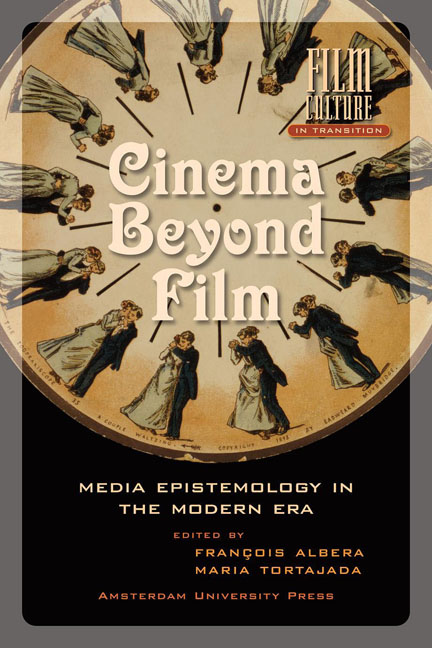The 1900 Episteme
Published online by Cambridge University Press: 22 January 2021
Summary
Introduction
The technical society that came into being in the 17th century and became the flourishing industrial society of the 19th century introduced a series of new conditions into the field of image and sound. These conditions influenced firstly the effects that were sought and produced. There was a move both to record and reproduce reality as exactly as possible and, on the contrary, to create the fantastic and embody fantasy. There was the portrayal of such phenomena as movement, succession and the flow of time. Secondly, and more significantly, the new conditions had an impact on the means used, in other words, the devices and machines.
The mechanical model, which began with Descartes and de la Mettrie, overturned Aristotle’s physics and opened up a new conceptual space that gave rise to a series of propositions concerning the modes of apprehension of both objects and beings, with in particular the division into discrete units, which could then be combined. This conceptual space allowed for the body’s mobilising power and dynamics to be located outside of it. The importance of the paradigm of the clock in the seventeenth century is well known – the clock with its weights and the spring-driven watch were micro-mechanisms that inaugurated a new state that combined two types of movements and stop mechanisms to achieve regularity; its effect is to transform movement into information. One might speak of a ‘clock-making’ episteme spreading implicit or stated knowledge in various ways, in various sectors of knowledge, ideas, practices and institutions, knowledge based on dissociation, assembling, articulation, automatism, etc. (the clock or watchmaker was a central character in the 18th century together with clocks and also automata, right up to Méliès’s Robert-Houdin theatre).
We speak here of episteme. The term, coined by Michel Foucault, is problematic, partly because of the way it ‘competes’ in this chapter with the notions of ‘model’ and ‘paradigm’ with which it is often confused. Foucault’s episteme has a characteristic which distinguishes it from the paradigm (described by Thomas S. Kuhn) and a fortiori from the model, in that it does not define a state of knowledge – whether scientific or philosophical – at a particular moment, but that which makes a theory, practice or opinion possible.
- Type
- Chapter
- Information
- Cinema Beyond FilmMedia Epistemology in the Modern Era, pp. 25 - 44Publisher: Amsterdam University PressPrint publication year: 2012



